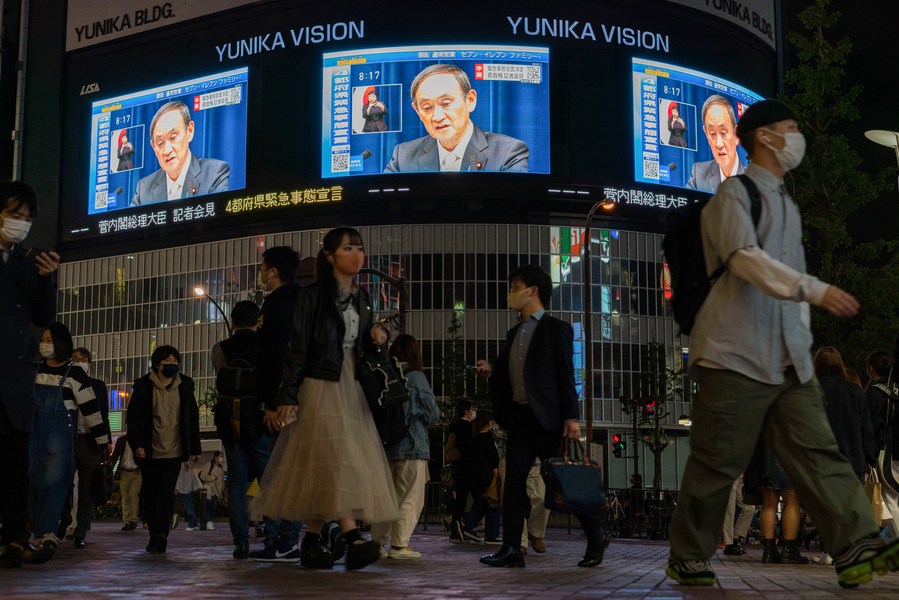TOKYO, June 16 (Xinhua) -- Japan's parliamentary session closed Wednesday after a no-confidence motion in Prime Minister Yoshihide Suga's Cabinet filed by the opposition camp was voted down in the lower house on the previous day.

Japan's Prime Minister Yoshihide Suga is shown on outdoor screens during a press conference as he declares a state of emergency over COVID-19 in Tokyo, Japan on April 23, 2021. (Photo by Christopher Jue/Xinhua)
The request for the extension came as the Constitutional Democratic Party of Japan (CDPJ) and three other opposition parties have been critical of the government's response to the COVID-19 pandemic, particularly the slow pace of the vaccination campaign.
They have also taken issue with Suga's pledge that holding the Olympics this summer in Tokyo from July 23 will be "safe and secure" as the COVID-19 pandemic has yet to be brought under control.
The parties believed more time is needed in the parliament to debate these highly pressing topics.
CDPJ leader Yukio Edano has accused Suga as being an unfit leader for not allowing the current parliament session to be extended during a national crisis.
Edano lambasted the Japanese leader for "stopping the highest institution of the state from functioning for an extended period during the worst crisis since the end of the war."
"On that point alone, he is unfit to be a leader during an emergency," Edano said before the vote on the no-confidence motion was held in a lower house plenary session on Tuesday afternoon.
The opposition camp also include the three other parties jointly filing the motion, namely the Japanese Communist Party, the Democratic Party for the People and the Social Democratic Party.
The opposition parties are also concerned that the capital Tokyo is currently under a third COVID-19 state of emergency, along with nine other prefectures, due to the spread of the virus and its highly contagious variants, as the entire nation continues to grapple with a fourth wave of infections.
Suga has said that bringing the COVID-19 situation under control remains his top priority but he could dissolve the lower house of parliament and call a snap election at any time.
The general election must be held before the current four-year term of lower house members ends on Oct. 21.
With a general election now on the horizon, the opposition camp have been left with little time to debate the issues they believed are in the public's best interest, although the CDPJ's head of Diet affairs Jun Azumi seemed undeterred about the upcoming election itself.
"The opposition won't be constrained or threatened and stands ready to fight in the event of a general election," Azumi told reporters.
Along with the hosting of the Olympics, Tokyo will also hold a Metropolitan Assembly election in early July with the results viewed as a litmus test for the future direction of national politics.
Senior members of the ruling coalition have suggested, however, that Suga will not dissolve the lower house of parliament and call a snap election before the Tokyo Metropolitan Assembly election or the Olympics.
As for the best time to hold the general election, Japan's public broadcaster NHK said it would depend on a number of factors, including "the spread of the coronavirus, progress in vaccination efforts and the Cabinet's plunging public approval ratings."


